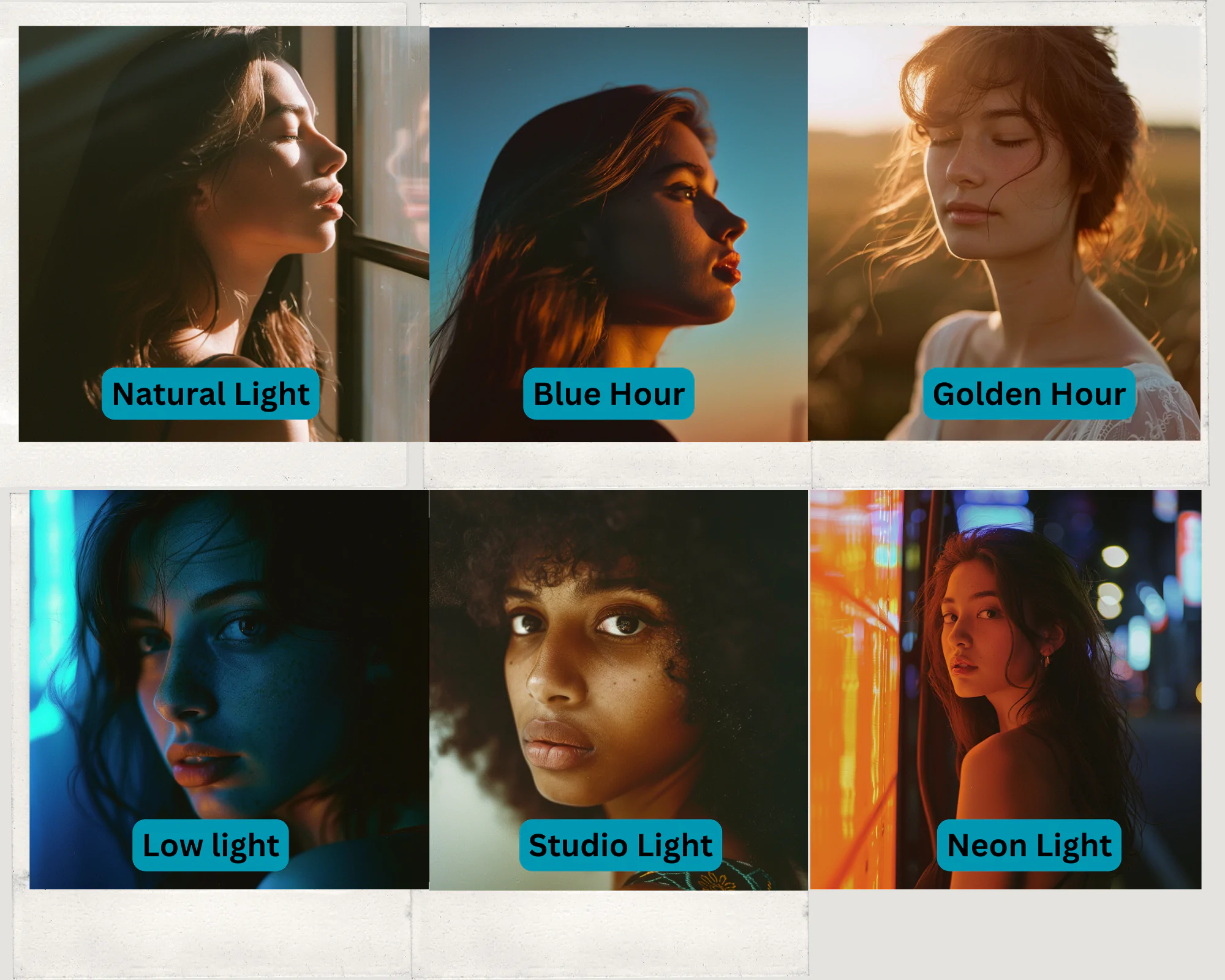Lighting Prompts for Midjourney

The Importance of Lighting Direction in Creating Realistic Images with MidJourney
Creating realistic images with AI, especially in MidJourney, can be a fun and rewarding experience. However, one of the key elements to achieving lifelike results is understanding and applying the right type of lighting direction in your prompts. Even if you’re a beginner in AI and not a photographer, this guide will help you grasp the basics of lighting direction and how it can enhance your images.
Why Lighting Direction Matters
- Sets the Mood: The direction of lighting can dramatically change the mood of your image. For example, soft, diffused lighting can create a calm and serene atmosphere, while harsh, direct lighting can make an image look dramatic and intense.
- Adds Depth and Dimension: Proper lighting direction helps to add depth and dimension to your images, making them look more three-dimensional and realistic.
- Highlights Features: It emphasizes important features of your subject, such as facial expressions in portraits or textures in landscapes.
MidJourney Lighting Guide
When you’re working with MidJourney to create realistic images, getting the lighting right can make a huge difference. Lighting sets the mood, adds depth, and highlights important features. To help you out, I’ve put together a list of different types of lighting that you can use in various situations. Each type has its own unique effect and can really bring your images to life. Check out the list below to see how you can use these lighting techniques to enhance your projects.
(Lighting Guide in Midjourney)
Click here to explore the Prompt Structure guide!
Prompt structure: Portrait (description),Type of Light, Background Description,Camera Type
Below I have given the Prompt Structure for first Prompt for better understanding.
Portrait (description):
- A side profile portrait of a lady with a serene expression. The sunlight and soft shadows enhance the subtle textures of her skin, emphasizing calmness and tranquility.
Type of Light:
- Afternoon sunlight, which is warm and soft, casting gentle shadows. The light emphasizes the contours of her face while creating a soft, natural glow around her.
Shot Type:
- Side profile shot. This framing focuses on the lady’s facial features and expression, highlighting the effect of the light and shadows on her skin.
- The background is softly lit, suggesting a subtle, unobtrusive ambiance. The focus remains on the lady, with the lighting ensuring that the background does not distract from her but complements the overall warmth of the scene.
Camera Type:
- Kodak Portra film (implied). This is a film known for its fine grain, soft color tones, and natural skin tones, giving the portrait a warm, cinematic quality
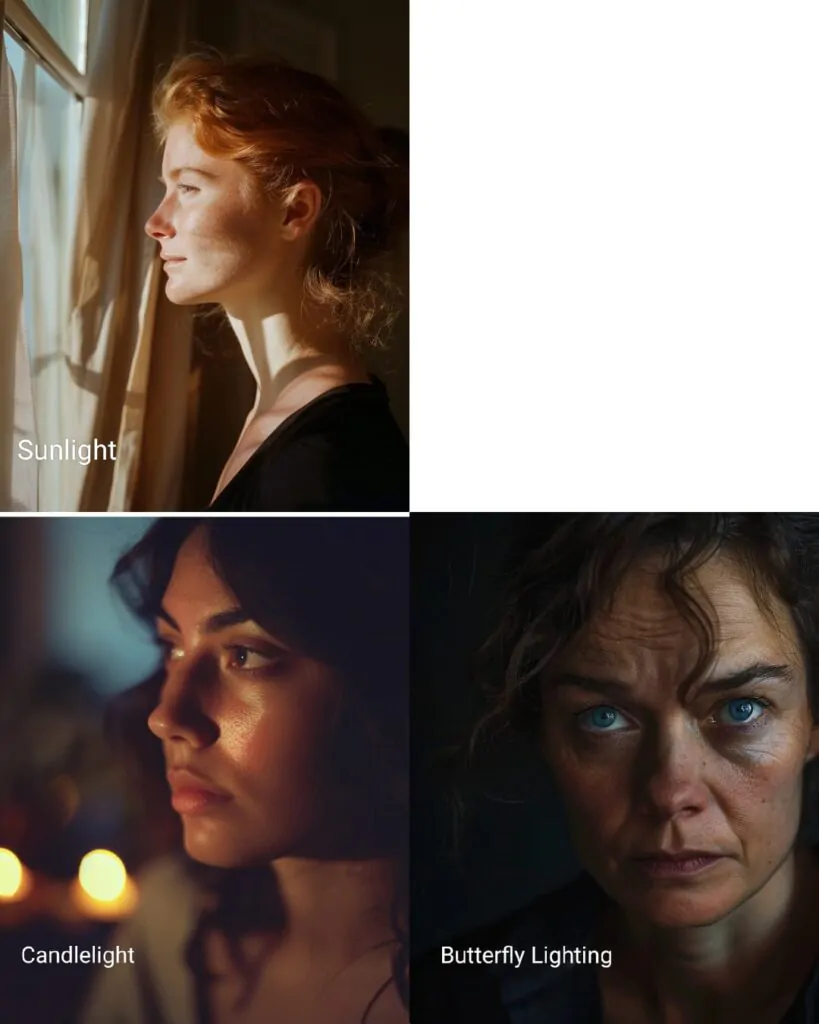
1.SUNLIGHT– side profile portrait of a lady standing in front of a french window, afternoon sunlight falling on her, soft shadows , highlighting her serene expression and the subtle textures of her skin, The background is softly lit, ensuring the focus remains on the lady and the warm glow around her, Kodak Portra 800 –v 6.0
2.CANDLELIGHT -Portrait of a lady illuminated by soft warm candlelight,highlighting her serene expression and the subtle textures of her skin, background is dim and indistinct, ensuring the focus remains on the lady and the warm glow around her, Kodak Portra 800 film type
3.BUTTERFLY -create a portrait of 40 year old women, butterfly lighting, looking in the camera, worried look.



Prompt : Front view of a vibrant blue bioluminescent water, casting an ethereal light and forming intricate patterns., background sky is a blend of warm yellow and orange hues, serene and minimalist, Kodak Vision3 500T AR 16:9 –v 6.0
- Candlelight: Soft, warm light produced by a candle.
- Reflected Light: Light bounced off surfaces to create softer illumination.
- Sunlight: Natural light from the sun.
- Overcast: Diffused light on a cloudy day.
- Window Light: Natural light coming through a window.
- Twilight: Soft light after sunset or before sunrise.
- Backlit: Light coming from behind the subject.
- Blue Hour: Soft blue light just before sunrise or after sunset.
- Golden Hour: Warm, soft light shortly after sunrise or before sunset.
- Midnight: Low light conditions at night.
- Dappled Light: Light filtered through leaves or other irregular surfaces.
- Sunrise/Dawn: The first light of the day.
- Sunset/Dusk: The last light of the day.
- Side Lighting: Light coming from the side of the subject.
- Filtered Light: Light passing through a material to create softer shadows.
- Fire Light: Light produced by a flame.
- Light Leaks: Unintended light flares in photography.
- Alpenglow: Red light seen on mountains just after sunset or before sunrise.
- Lens Flares: Bright light spots created by the lens.
- Direct Sunlight: Harsh, bright light from the sun.
- Directional Light: Light aimed in a specific direction.
- Ambient: General light in a scene.
- Light Streaks: Lines of light created by moving light sources in a photo
- Bioluminescence: This is a naturally occurring phenomenon in living organisms.
- Lighting Through Crystals: Can use either natural sunlight or artificial directional lights. Lighting Through Glass: Can involve either natural light (e.g., sunlight through windows) or artificial directional sources.
Artificial and Directional Lighting in Midjourney
Specific Light Sources
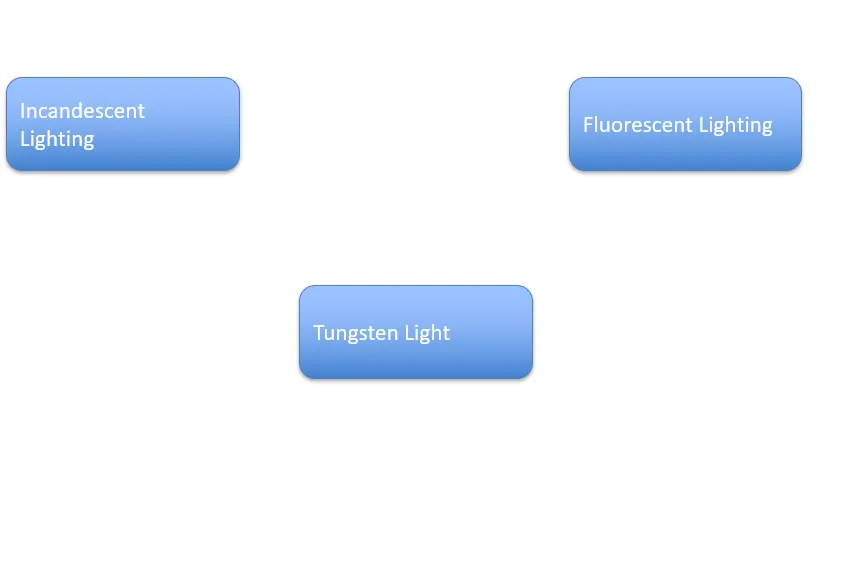

Prompt Structure: Type of Light, Portrait (description), Background Description, camera type
Prompt: tungsten Lighting falling from the front, Portrait of a lady in golden yellow suit, beige background, bold, warm, colourful, cheerful, Kodak Portra 800 film type –ar 3:4 (Try the prompt with diff light settings)Incandescent Lighting: Warm light from traditional light bulbs.
Fluorescent Lighting: Cool light from fluorescent tubes.
Tungsten Light: Warm light from tungsten bulbs.
Tungsten Light Effect in Midjourney:
In these two images, we’ve used a tungsten light effect while generating them in MidJourney to create a warm, inviting atmosphere. Tungsten lighting typically gives off a cozy, golden glow, and you can see that reflected in the golden hues across the models’ skin and outfits. It creates a soft, warm light that highlights their features and makes the whole scene feel intimate and rich.
Notice the backgrounds too—those glowing city lights and the beautiful bokeh effect are enhanced by the tungsten lighting. This effect gives the images a warm, cinematic vibe, with orange-yellow tones that you often associate with night photography or indoor lighting.
So if you’re looking to replicate this look in your own MidJourney creations, try experimenting with tungsten lighting to give your images that same warm, golden, and magical atmosphere. It’s a great way to add depth and mood to your images!
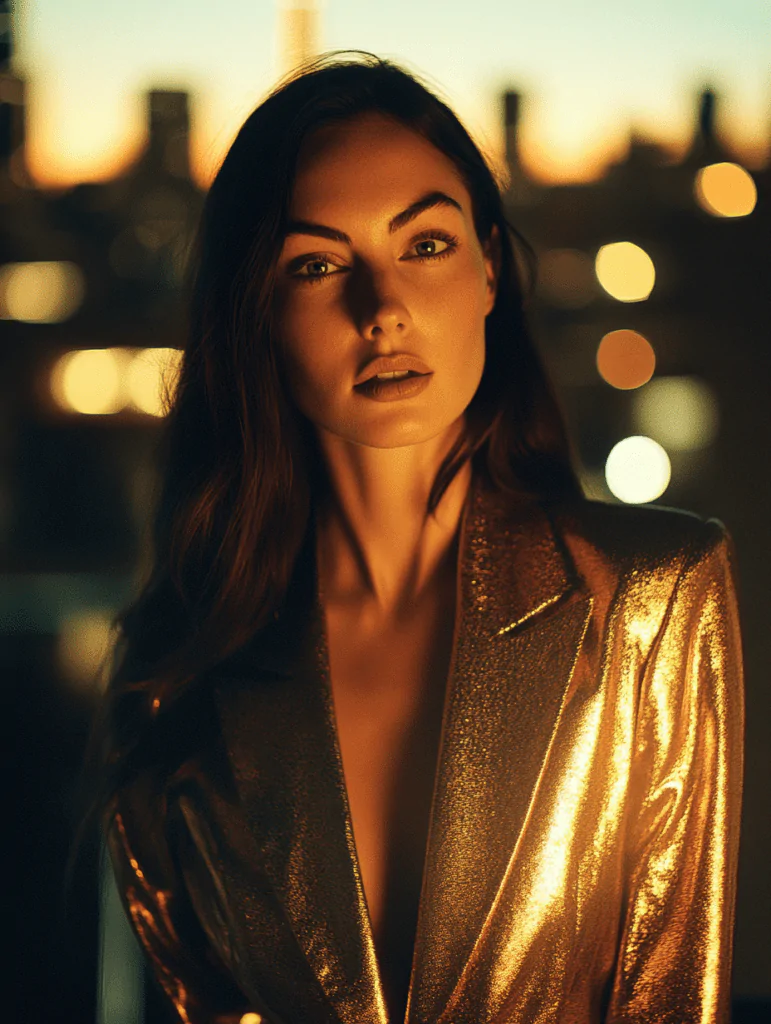
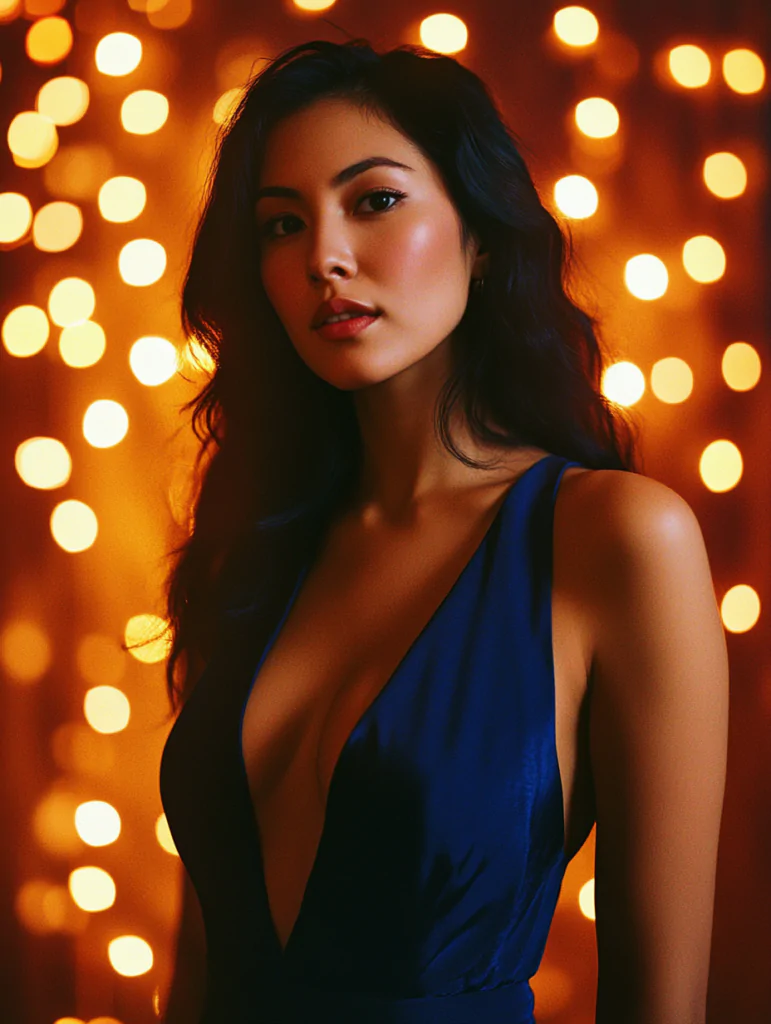
Studio and Cinematic Techniques
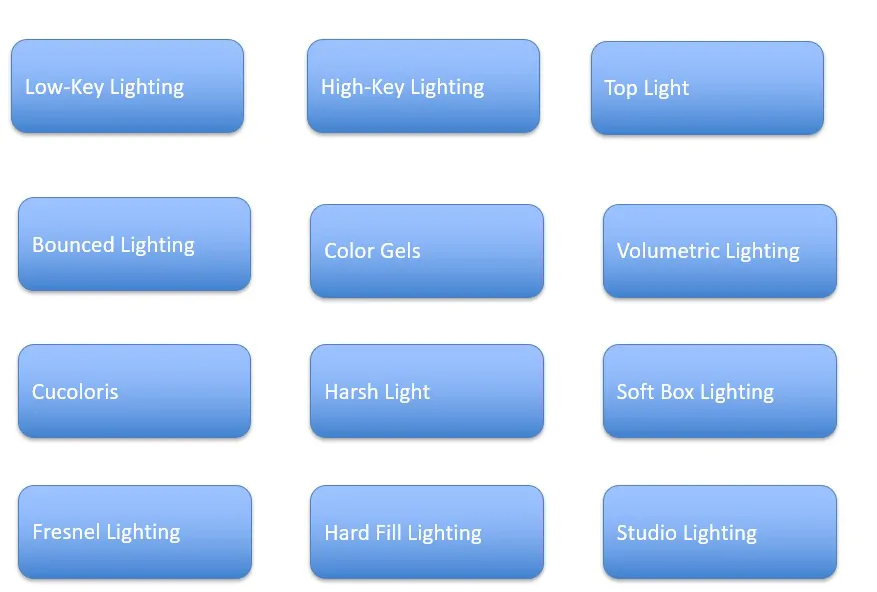
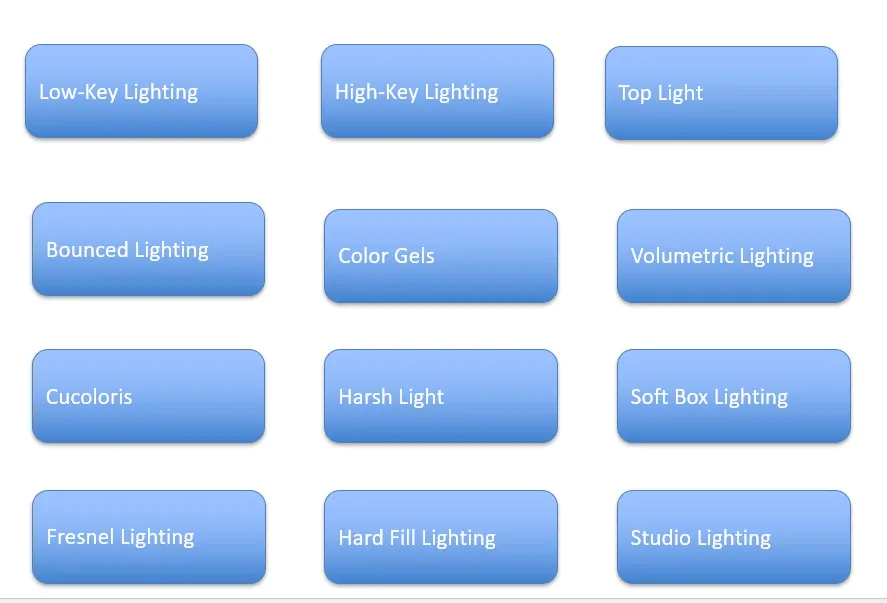

Prompt Structure:Type of Light, Portrait (description), shot type, Background Description, film type
Prompt:low key Lighting, portrait of a lady in maroon suit, front profile,looking in the camera, bold, warm, colourful, cheerful, Kodak Portra 800 film type –ar 3:4 –v 6.0 (Try the prompt with different light settings)- Strobe Lighting: Flash lighting used in photography.shot type,
- Ring Lighting: Circular light used to reduce shadows.
- Duo-tone Lighting: Lighting that creates two distinct colors.
- Butterfly Lighting: Light above and in front of the subject creating a butterfly shadow under the nose.
- Light Painting: Creating images using moving light sources.
- Rembrandt Lighting: Light creating a triangle of light on the subject’s cheek.
- Gobo Lighting: Light shaped through patterns.
- Catchlight(s): Small reflections of light in the subject’s eyes.
- Cross Lighting: Light from two directions creating strong shadows.
- Split Lighting: Light splitting the subject’s face into light and dark halves.
- Bare Bulb Lighting: Direct light from an unmodified bulb.
- Rim Lighting: Light highlighting the subject’s edges.
- Low-Key Lighting: Dark, high-contrast lighting.
- High-Key Lighting: Bright, low-contrast lighting.
- Top Light: Light coming from directly above.
- Bounced Lighting: Light reflected off a surface to soften it.
- Color Gels: Colored filters for lights.
- Volumetric Lighting: Light beams visible through fog or dust.
- Cucoloris: Patterned lighting to create shadows.
- Harsh Light: Bright, strong light creating sharp shadows.
- Soft Box Lighting: Diffused light from a softbox.
- Fresnel Lighting: Adjustable spotlight commonly used in theaters.
- Hard Fill Lighting: Strong fill light to remove shadows.
- Studio Lighting: Controlled lighting setup in a studio.
- Snoot Lighting: Narrow beam of light.
- Beauty Dish Lighting: Soft, even light for beauty shots.
- V-flats: Large panels to shape and reflect light.
- Umbrella Lighting: Light diffused by an umbrella.
- Scrim Lighting: Light diffused through fabric.
- Moody Lighting: Dark, dramatic lighting setup.
- Ring Flash: Circular flash for even lighting.
- Chiaroscuro Lighting: High-contrast lighting creating strong shadows.
- Cinematic Lighting: Dramatic lighting used in films.
- [Color] Lighting: Colored lights to create mood.
- Parabolic Reflectors with Diffusion: Reflective dishes for focused light.T
- hree Light Setup: Standard setup with key, fill, and back lights.
- Global Illumination: Realistic lighting that simulates natural light behavior.
Event-Specific Lighting

- Concert Lighting: Dynamic lighting used in live performances.
- Club Lighting: Colorful, dynamic light for clubs.
- Instagram Lighting: Aesthetic lighting for social media.
- Optical Flares: Bright light artifacts in photos.
- Silhouette Lighting: Backlighting to create a dark outline.
- Lighting Through Crystals: Light passing through crystals to create patterns.
- Lighting Through Glass: Light passing through glass for unique effects.
- Motivated Lighting: Light sources that are visible in the scene.
- Lighting Through Crystals: Can use either natural sunlight or artificial directional lights. Lighting Through Glass: Can involve either natural light (e.g., sunlight through windows) or artificial directional sources.
1. Prompt Structure: Portrait (description),Type of Light, Background Description,Camera Type
2.Prompt Structure: Type of Light, Portrait (description), Background Description, camera type
In reference to the above two prompt structures, the earlier a term appears in the prompt, the more weight MidJourney tends to give it. If one of the prompt structures isn’t giving the desired result, try switching to the other format.
Background Description
Let Us Understand What Happens When You Include Background Details
When you’re creating prompts for AI image generation tools like MidJourney, every detail you include helps the AI better understand your vision. One critical component that’s often overlooked is the background description. You might think mentioning the main subject is enough, but as this example will show, the background can dramatically impact the final result.
Let’s explore why including the background makes a difference and what happens when you don’t.
Here’s a prompt with a clear background description:
Prompt -side profile, lady standing in front of a french window, afternoon sunlight falling on her, soft shadows , highlighting subtle textures of her skin, The background is softly lit, Kodak Portra 800
Result:
The AI generated consistent and accurate images:
- In all images, the lady is facing the French window as described.
- The softly lit background creates a cohesive atmosphere, aligning perfectly with the lighting direction.
Why? Including “the background is softly lit” gave the AI a clear understanding of how the environment should interact with the subject. This detail helped ensure that the AI interpreted the scene correctly.


What Happens When You Leave Out Background Details?
Now let’s remove the background description from the prompt:
Prompt: Side profile, lady standing in front of a French window, afternoon sunlight falling on her, soft shadows, highlighting subtle textures of her skin, Kodak Portra 800.
Result:
The AI produced inconsistent images:
- Two images showed the lady facing the window as intended.
- The other two images showed the lady with her back to the window, which wasn’t specified.
Why? Without the background description, the AI became confused. While “facing the window” was mentioned, the lack of context about the lighting in the background left the AI uncertain about how to compose the scene. The result? A mix of orientations and lighting that didn’t fully match the intended vision.
Takeaway
Including a detailed background description in your prompt makes all the difference:
- It clarifies the scene for the AI.
- It ensures consistency across images.
- It creates a cohesive relationship between the subject and the environment.
Think of it this way: the background isn’t just a supporting element—it’s an essential part of the story your image is trying to tell.
To learn about different film types that can be used in Midjourney, click below
Click here for the prompt structure to start crafting your perfect prompt!
